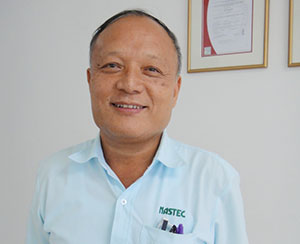Training key to sustainability
 Nastec has had a factory in China since 1992, why did your company decide to build another factory in Vietnam?
Nastec has had a factory in China since 1992, why did your company decide to build another factory in Vietnam?
Our company built a factory in Shanghai, China in 1992 and exported products to Japan from there. In recent years, with China’s development, domestic demand has grown and now more than 80 percent of our products are for the Chinese market, so we have had to identify a new location for an export-orientated manufacturing plant.
We researched Indonesia, Thailand and Vietnam and took into account factors such as low labour costs, friendliness to Japan and their potential for development in the future. Finally, we chose Vietnam, and the factory located in Binh Duong province went into operation in 2005.
How do you evaluate Vietnamese workers?
Because we have a varied selection of products and small quantities of shipments, we have to produce a variety of different items. We also have to fulfil different customer needs, so I think it’s very technical work. For our company, a new employee needs about three years to become truly skilled. Moreover, to be able to read the technical drawings by themselves and understand the use of the product they’re manufacturing, they need to understand the processing method and plan the work, this takes even longer. However, it’s obvious that not every employee needs to have such skills. We only have ten workers out of our 180 employees that have reached that level. I think that staffs that have reached that level of ability are excellent.
How did you train employees in Vietnam?
We started with 80 employees and 25 of our current employees have been with us since we started operations in Vietnam. All the employees we employed lacked experience when we first hired them, so we had to provide training to the entire workforce. Technical training is inevitable, but I think before being trained about techniques, basic education on some fundamentals is important. Such as, what do they think about their career in the future? If they choose to work only because of the wages and consider changing jobs continuously to chase increased salaries, they’ll never accumulate any experience. We often tell employees that if they remain patient and do the job for a while they will accumulate technical experience. That made them think more deeply about the techniques and they then were able to develop their own techniques and approaches. Among our 180 employees, there are about 10 people who are capable of taking managerial roles. They think about how their clients use these cutting tools and can plan how to create the right products.
As your business is related to the support industry sector, what do you think about the development of Vietnamese support industries?
I think that Vietnamese businesses now have to face more challenges. If you just do the simple tasks, you’ll never know how or when to upgrade your technical level of expertise. I think technical levels improve then confronted by difficult and complex requirements, such as those from Japanese businesses, so I really wanted them to cope with greater technical challenges. It’s not only about producing vast amounts of cheap products; to produce high-value product, businesses and individuals should embrace challenges, not chose the easy option, as firms will benefit in the long run. I think the important thing is whether a company plans for the future or not.
I heard that your company will participate at the Manufacturing Expo and METALEX Vietnam events, what are your thoughts on the exhibition?
We opened this factory eight years ago, I’ve seen a gradual improvement in the support industry sector during this period and there are more places that require our products, so I decided that it was now the right time for us to participate in the Manufacturing Expo and METALEX events for the first time. Although Vietnam currently doesn’t have a need for our cutting tools, within five to ten years, when Vietnam’s industries develop, there will invariably be more clients in the domestic market, just like it was in China. I think the domestic market will be using our products in the near future.
What the stars mean:
★ Poor ★ ★ Promising ★★★ Good ★★★★ Very good ★★★★★ Exceptional
Latest News
More News
- State corporations poised to drive 2026 growth (February 03, 2026 | 13:58)
- Why high-tech talent will define Vietnam’s growth (February 02, 2026 | 10:47)
- FMCG resilience amid varying storms (February 02, 2026 | 10:00)
- Customs reforms strengthen business confidence, support trade growth (February 01, 2026 | 08:20)
- Vietnam and US to launch sixth trade negotiation round (January 30, 2026 | 15:19)
- Digital publishing emerges as key growth driver in Vietnam (January 30, 2026 | 10:59)
- EVN signs key contract for Tri An hydropower expansion (January 30, 2026 | 10:57)
- Vietnam to lead trade growth in ASEAN (January 29, 2026 | 15:08)
- Carlsberg Vietnam delivers Lunar New Year support in central region (January 28, 2026 | 17:19)
- TikTok penalised $35,000 in Vietnam for consumer protection violations (January 28, 2026 | 17:15)
















 Mobile Version
Mobile Version